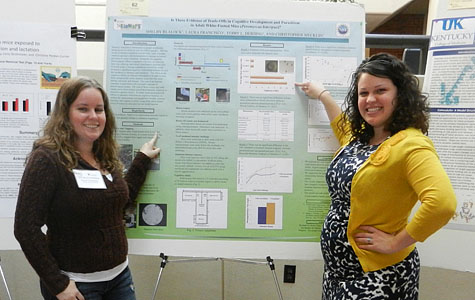 |
Shelby Blalock, Jared Guthrie and
Laura Francisco
Department of Biological Sciences
Murray State University
Mentors: Terry
L. Derting
and Chris Mecklin
Title of Presentation:Is There Evidence of Trade-offs in Cognitive Ability and Parasitism in Adult White-footed Mice (Peromyscus leucopus)?
Presented at:Kentucky Academy of Science and Posters-at-the-Capitol in Frankfort, KY
The research was supported by: The National Science Foundation
ABSTRACT
Levels of parasitic infections and disease have been positively correlated with the intelligence quotient of humans. The relationship may result from re-allocation of energy away from brain development and toward energetically-expensive immune responses during growth of children. We questioned whether similar trade-offs in energy allocation occur in adults, resulting in reduced brain function during incidences of disease or infection. We tested the hypothesis that there is no relationship among parasite burden, immunocompetence, and cognitive ability. We live-trapped adult white-footed mice (Peromyscus leucopus) in wooded habitats in Calloway County, Kentucky. Mice were brought into the lab and caged individually. Parasite load was estimated from fecal floats and egg counts. Animal health was assessed using blood cell counts and hematocrit level. Immune system competency was evaluated by applying a T-cell mediated challenge to all mice using 2, 4-dinitro-1-fluorobenzene and a humoral challenge using sheep red blood cells. Cognitive ability was estimated by evaluating spatial memory. Parasites were found in 12 of 26 mice. Infected mice were usually parasitized by one or two species of parasite. There were no significant differences in blood cell counts, hematocrit, or immune responses between parasitized and non-parasitized mice. Also, there was no significant difference in mean spatial memory score between parasitized and non-parasitized mice. Among the parasitized mice, however, a negative relationship existed between spatial memory score and parasite load. Our results supported the reported relationship between parasitism and cognitive ability in humans, but not the proposed explanation of energy trade-offs between the immune and nervous systems.
|
|


![]()